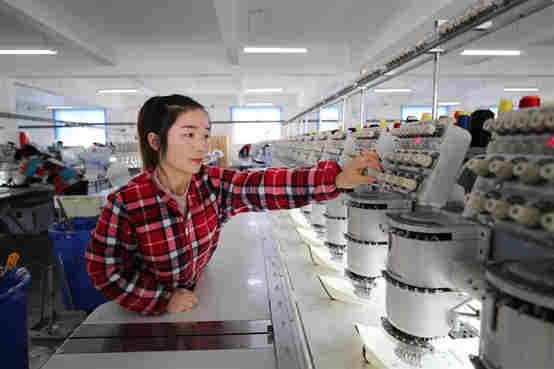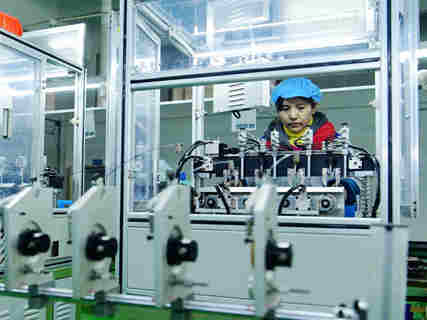


Photo taken on Feb. 20, 2019 shows a migrant laborer works on the production line at a factory in Chengtou town, Ganyu district of Lianyungang city, east China's Jiangsu province. At present, more than 30,000 returned migrant workers in the district have become a new force of local private enterprises after free training. (Photo by Si Wei from People's Daily Online)
China has taken a bunch of measures to support the development of the private economy, which is a sector of great concern to the society, a spokesperson with the annual session of the country's top political advisory body said on March 2.
As an important part of the socialist market economy, the private economy plays an irreplaceable role in stabilizing growth, promoting innovation, increasing employment, and improving people's livelihood, Guo Weimin, spokesperson for the second session of the 13th Chinese People’s Political Consultative Conference (CPPCC) National Committee, told a press conference.
Boosting the private sector was a priority issue of the CPPCC National Committee last year, Guo said, disclosing that China's private investment has accounted for more than 60 percent of the country's fixed asset investment for five consecutive years since 2012.
Private enterprises contributed to more than half of China's taxation with nearly 40 percent of resources, 60 percent of GDP, 70 percent of technological innovation and new products, 80 percent of urban employment and 90 percent of new jobs, the spokesperson said.

A laborer works at a factory of Huaheng New Energy, a private enterprise specializing in solar cells in east China’s Jiangsu province. The company started production on July 1, 2018. Photo by Sun Jingxian from People's Daily Online
Over the past years, the country has rolled out incentives for companies willing to put more emphasis on financing, made good use of government-led funds, and established the mechanism to provide short-term funds for companies unable to pay for loans on time.
It has improved the risk compensation mechanism for lending to private businesses in a bid to encourage banks and financial institutions to further reduce fees for and give more benefits to small- and micro-sized enterprises (SMEs), and regulated fees charged by intermediaries for financing services.
The country has also promoted the establishment of a financing guarantee system, and deepened the cooperation between banks and financial institutions, enterprises and tax authorities to address the difficulty of financing for law-abiding firms.
The country has also improved business registration facilitation. It launched a series of reforms, including the reform of the registered capital system, the reform to achieve "issuing a license before an operating permit", the reform of the registration system by merging different forms of certification required of businesses into one certificate, and the reform of simplifying enterprise deregistration.

Photo taken on Jan. 3, 2019 shows employees produce automotive micro-motors at a workshop of Nantong Goyomotor Co.Ltd, a private auto parts company in the high-tech zone of Hai'an, east China's Jiangsu province. (Photo by Gu Huaxia from People's Daily Online)
These measures have stimulated market vitality and consolidated the foundation for the development of private enterprises, providing new drivers for economic transformation and upgrading.
China has set up efforts to help clear arrears to SMEs. Since November 2018, all regions, relevant departments and large state-owned enterprises have acted to pay off the overdue debt to SMEs and private companies as required.
So far, a total of 160 billion yuan (about $23.8 billion) has been paid, which has been used preferentially to settle the wages owed to migrant workers and projects related to people's livelihood.
China has continuously relaxed market access, expanded space for private investment, and made investment and trade more convenient. The country has further opened key areas such as civil aviation and railways, attracted private investment to actively participate in the construction of civil airports and high-speed railway projects, and guided monopoly industries to introduce private investment through mixed-ownership reform.
By deepening the Internet Plus government services model, the government has made it easier and more efficient for private enterprises to start and operate businesses.
China has lowered the burden of taxes and fees on private enterprises.
Since the reform of the replacement of business tax with value added tax (VAT), the government has actively lowered the income tax burden of private enterprises, reduced and exempted some government funds, and cut fees and charges levied on businesses.
In the future, substantial tax and fee cuts including the reduction of VAT will be advanced, while tax exemptions will be provided for SMEs as well as technology startups. The nominal rates for social security contributions will also be lowered.
 Fire brigade in Shanghai holds group wedding
Fire brigade in Shanghai holds group wedding Tourists enjoy ice sculptures in Datan Town, north China
Tourists enjoy ice sculptures in Datan Town, north China Sunset scenery of Dayan Pagoda in Xi'an
Sunset scenery of Dayan Pagoda in Xi'an Tourists have fun at scenic spot in Nanlong Town, NW China
Tourists have fun at scenic spot in Nanlong Town, NW China Harbin attracts tourists by making best use of ice in winter
Harbin attracts tourists by making best use of ice in winter In pics: FIS Alpine Ski Women's World Cup Slalom
In pics: FIS Alpine Ski Women's World Cup Slalom Black-necked cranes rest at reservoir in Lhunzhub County, Lhasa
Black-necked cranes rest at reservoir in Lhunzhub County, Lhasa China's FAST telescope will be available to foreign scientists in April
China's FAST telescope will be available to foreign scientists in April "She power" plays indispensable role in poverty alleviation
"She power" plays indispensable role in poverty alleviation Top 10 world news events of People's Daily in 2020
Top 10 world news events of People's Daily in 2020 Top 10 China news events of People's Daily in 2020
Top 10 China news events of People's Daily in 2020 Top 10 media buzzwords of 2020
Top 10 media buzzwords of 2020 Year-ender:10 major tourism stories of 2020
Year-ender:10 major tourism stories of 2020 No interference in Venezuelan issues
No interference in Venezuelan issues
 Biz prepares for trade spat
Biz prepares for trade spat
 Broadcasting Continent
Broadcasting Continent Australia wins Chinese CEOs as US loses
Australia wins Chinese CEOs as US loses